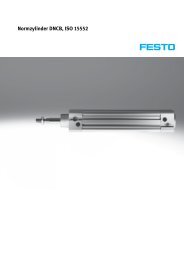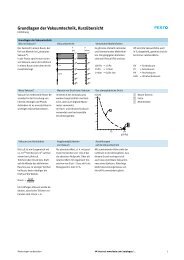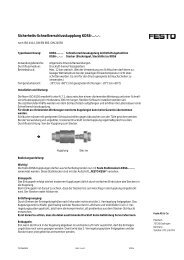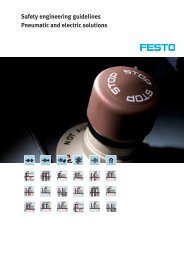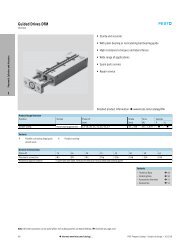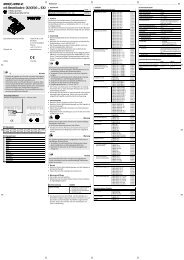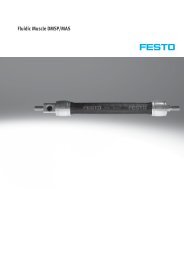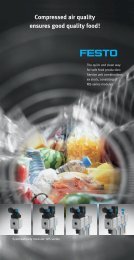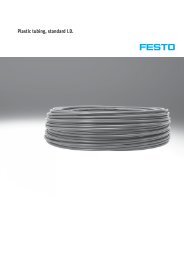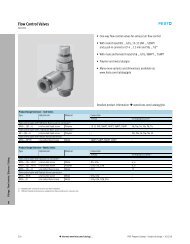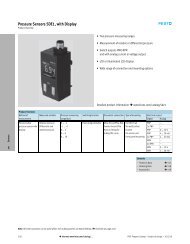Download latest edition - Festo
Download latest edition - Festo
Download latest edition - Festo
Create successful ePaper yourself
Turn your PDF publications into a flip-book with our unique Google optimized e-Paper software.
Interview<br />
No race<br />
for resources<br />
Egon Müller is one of the leading experts in innovative production structures and factory<br />
concepts. The Professor of Factory Planning and Factory Management at the Chemnitz<br />
University of Technology believes that savings potential of up to 50% can be realised over<br />
the next decade through environmental production factors. In this interview he explains<br />
the importance of staying out of the race for energy resources.<br />
trends in automation: Professor Müller, you see a savings<br />
potential of between 30% and 50% of the total consumption<br />
of material and energy resources. Is this fi gure not too high?<br />
Prof. Egon Müller: To back up this statement, we need to fi rst<br />
remind ourselves of a well-known principle of physics. Energy<br />
can be transferred between systems, but cannot be created or<br />
destroyed. It can only be converted from one form of energy<br />
into another. Furthermore, energy conversion between different<br />
forms of energy and energy levels must take place in one<br />
direction and cannot be reversed. If you look at a factory as a<br />
“total energy consumption system”, in which a wide variety<br />
of energy conversion processes take place, the potential you<br />
referred to can be achieved systematically. When it comes to<br />
About the person<br />
Prof. Dr.-Ing. Egon Müller<br />
Egon Müller heads the Department of Factory Planning<br />
and Factory Management at the Chemnitz University of<br />
Technology. He and his team of 30 staff members work<br />
on the development of future production structures and<br />
new factory concepts in mechanical and plant engineering<br />
and for the automotive industry and its suppliers.<br />
These include fl exible and versatile factories as well<br />
as non-hierarchical regional production networks.<br />
The department offers extensive expertise in the fi eld<br />
of computer-based factory planning, modelling and<br />
simulation as well as energy-effi cient factory planning.<br />
www.tu-chemnitz.de/mb/fabrplan/englisch<br />
the consumption of material resources, the use of new materials<br />
and their cycles – in other words their reuse – is of major<br />
importance along with new technological methods. For factory<br />
planning and operation, this means generating new concepts<br />
that, for example, bring together mechanical engineering and<br />
process engineering in order to create these cycles.<br />
trends in automation: In your book "Energieeffiziente Fabriken<br />
planen und betreiben" (Planning and Operating Energy-efficient<br />
Factories), you show how the potential for energy savings<br />
can be exploited systematically. What are the key points here?<br />
Müller: I could refer to the necessary holistic approach,<br />
but that wouldn’t be any more useful than merely suggesting<br />
a systematic approach. A factory is fi rst and foremost a group<br />
of people who use the available machines and equipment<br />
to create products from materials. These processes are also<br />
planned by people and are therefore to be anticipated. We<br />
must develop appropriate competencies and train the people<br />
in the factory to realise this potential systematically using the<br />
methods and tools provided. Along with this aspect, a holistic<br />
view of the supply, conversion, transfer, and use of energy<br />
as well as its optimisation in the factory play a key role.<br />
trends in automation: To what extent can energy effi ciency<br />
be made a strategic competitive factor for a company?<br />
Müller: Continuously rising energy prices and the associated<br />
direct cost effect will be a major issue for companies in the<br />
future. Issues surrounding the availability of and access to<br />
energy resources will also become a strategic success factor<br />
for companies. Looking at the forecasts for future energy<br />
demand by energy source and economic area for the period up<br />
to 2030, it is already clear that companies in a position to opt<br />
out of this race for energy resources will have a major competitive<br />
advantage. It is also clear that the best energy effi ciency<br />
measure is, quite simply, to save energy.




